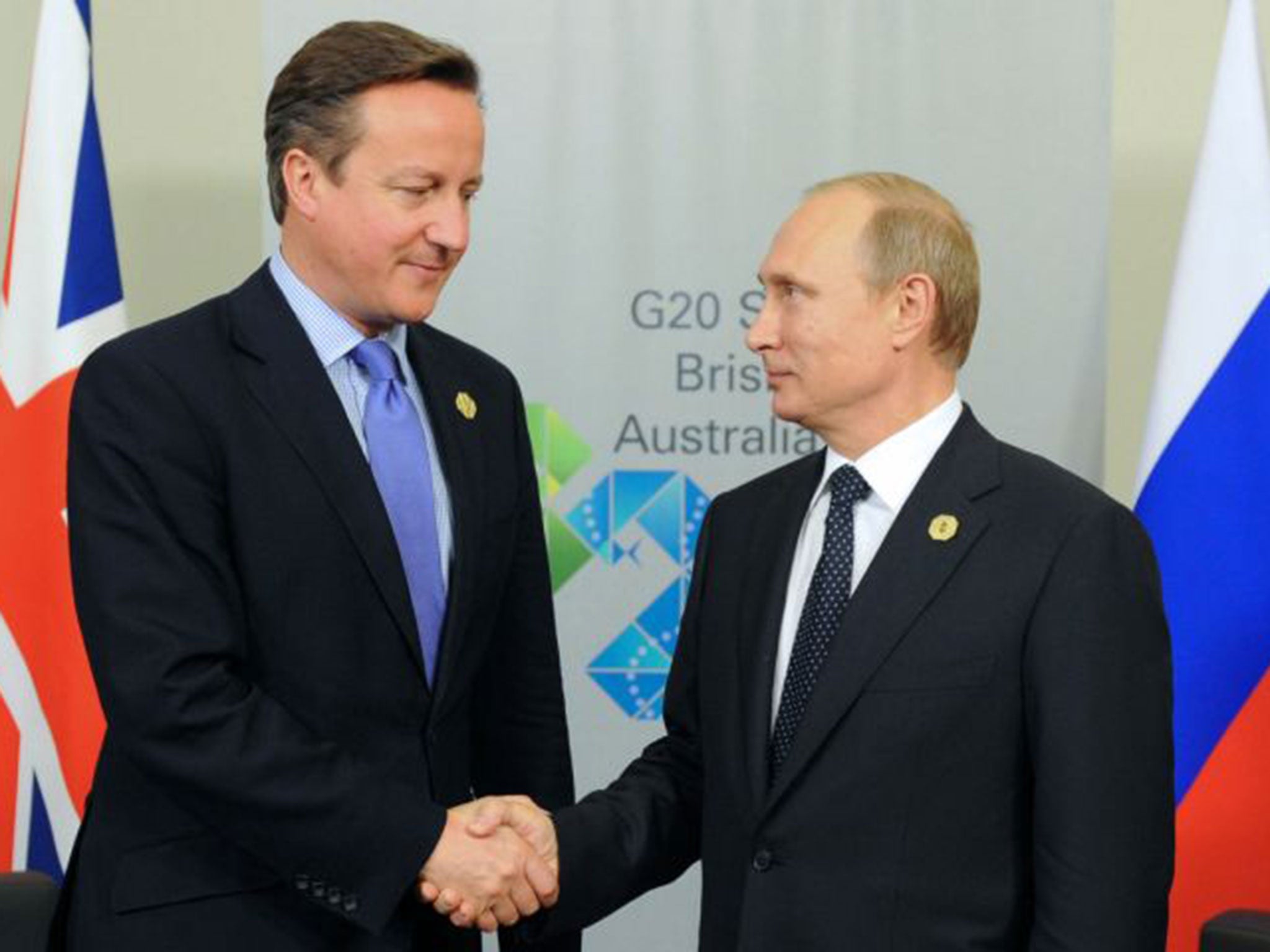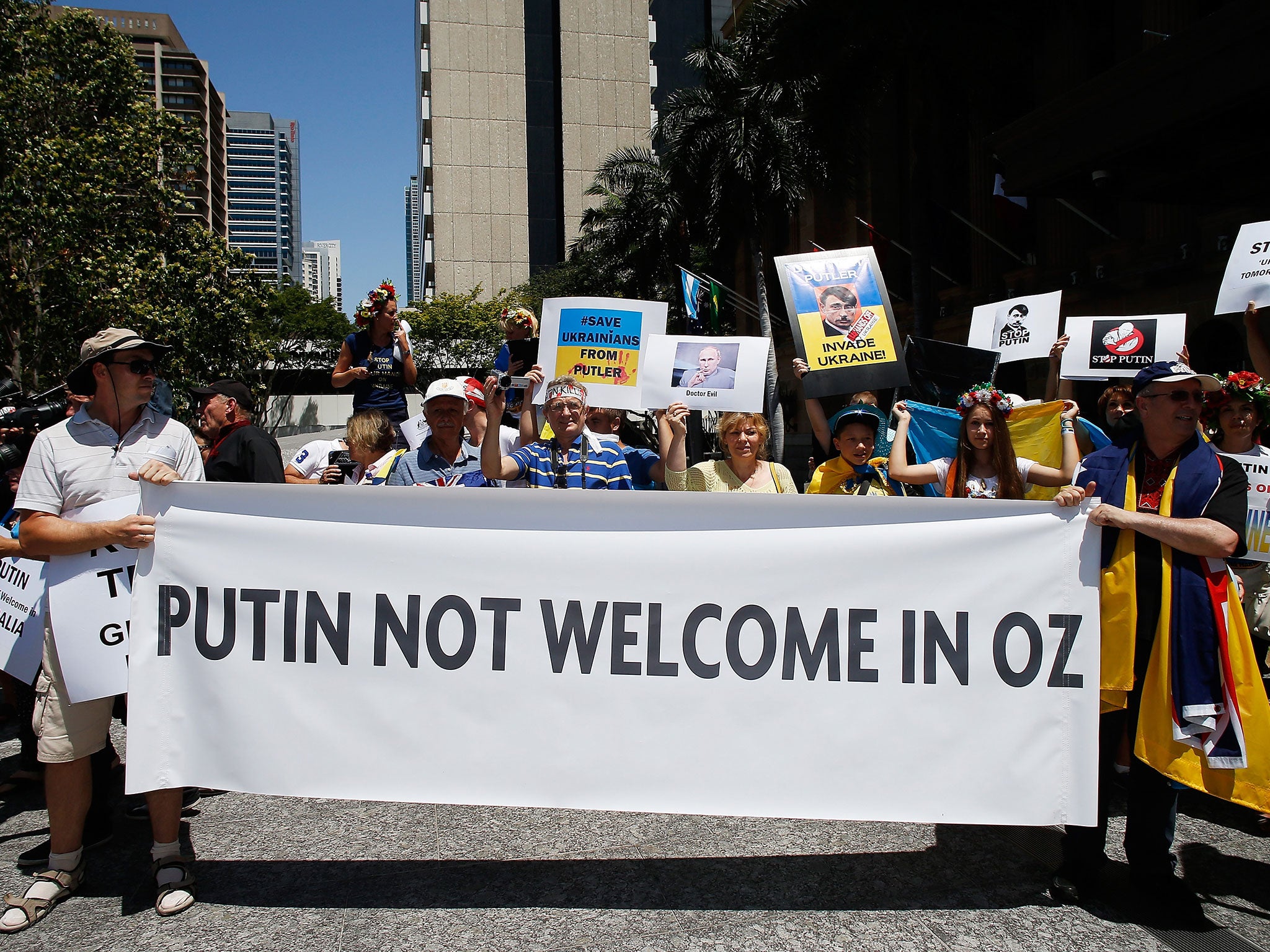G20 summit: David Cameron warns Vladimir Putin that Russia's relationship with the West is at a 'fork in the road' over Ukraine
Downing Street sources described the private talks between the leaders as 'robust' and 'frank'

David Cameron warned Vladimir Putin, face to face, that Russia’s whole post-Cold War relationship with the West is at a “fork in the road” over Ukraine.
After a tense build-up to the meeting over the past week, when the Prime Minister has repeatedly compared Russia’s interventions in Ukraine with the actions of Nazi Germany, the pair gave no quarter in talks lasting nearly an hour.
As they shook hands for the cameras at the G20 Leaders’ Summit in Brisbane, the two men barely made eye contact, and Downing Street sources described the private talks that followed as “robust” and “frank”. There were reports that Mr Putin decided to leave the meeting early today, missing the official lunch, following this meeting and a tense encounter with the French President, François Hollande.
Canada’s Prime Minister ,Stephen Harper, made clear his frustration as he met Mr Putin, telling him: “Well, I guess I’ll shake your hand, but I only have one thing to say to you: you need to get out of Ukraine.”
Australian Prime Minister Tony Abbott said he had told Mr Putin that “Russia would be so much more attractive if it was aspiring to be a superpower for peace and prosperity, if it was trying to be a superpower for ideas and for values, instead of trying to recreate the lost glories of tsarism or the old Soviet Union”.

Mr Cameron and other leaders, including President Barack Obama, are furious at what they view as the Russian annexation of Crimea on the Black Sea and the arming of Ukrainian rebels since the overthrow of President Viktor Yanukovych in February.
This has led to US and EU sanctions that have battered the rouble and damaged Russia’s stock exchange. An agreement signed in the Belarus capital, Minsk, two months ago was supposed to calm the situation, but Russia has reportedly broken its terms by continuing to send weapons over the border.
Despite warnings of further sanctions should Russia fail to pull troops and artillery out of Ukraine, Mr Putin challenged the West’s version of events. He believes that the West helped orchestrate the ousting of the pro-Russian Mr Yanukovych, who was popular in east Ukraine.
A No 10 source said that both leaders had set out “tough” stances. The source added: “The Prime Minister was clear at the start of the Ukraine discussions that we face a fork in the road, in terms of where we go next.
“The PM’s view was... focus on the future, ensure the sovereignty of a still-united Ukraine.”
Mr Putin repeated claims that he supports a “single political space” for Ukraine, and the Kremlin claimed that there was talk of an “abandonment of confrontational attitudes”.
Sitting opposite each other in black armchairs in a room in the Hilton Hotel, where Mr Putin is staying this weekend, Mr Cameron started discussions by warning Mr Putin there could soon be a “different relationship with Russia”. He said Russia could “go the Minsk way or another way”, meaning the least open diplomacy between the country and the West since the fall of the Berlin Wall.
However, it is understood that European finance ministers will not significantly alter sanctions at a meeting tomorrow, as has been previously suggested. They are likely to give Mr Putin more time to meet the Minsk obligations, though more rebels in Ukraine could see assets frozen.
Mr Cameron said: “We’re heading at the moment in the wrong direction. What we need is for Russia to change track and to stop destabilising Ukraine, to respect the Minsk agreement, to recognise that there’s only one legitimate government in Ukraine – and that’s the elected government – and to allow that country to make its own choices about its own future.... It’s important to warn of the dangers if Russia continues to head in the other direction.”
The G20 summit is ostensibly about the global economy, and the key themes this week were about world powers working together to create jobs and stimulate growth. Today, the G20, whose members account for 86.9 per cent of the world economy, are meant to make a commitment on how to add 2 per cent to projected economic growth by 2018.
But the event has been dominated by Mr Putin’s presence, and around 200 Ukrainian Australians staged a protest in Sydney.
Mr Abbott, who is the G20 president this year, has demanded that Mr Putin apologise for the shooting down of Malaysia Airlines flight MH17 over Ukraine in July, when 38 Australians were among the 298 killed. Mr Abbott believes there is irrefutable evidence that Russian-backed rebels using Russian weapons took down the plane.
Join our commenting forum
Join thought-provoking conversations, follow other Independent readers and see their replies
Comments
Bookmark popover
Removed from bookmarks